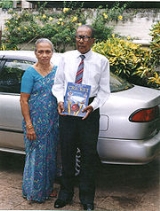
Ajith C. S. Perera
Encyclopedia
Ajith Chrysantha Stephen Perera, JP, CChem.
, FRSC
(born 29 February 1956), is a Chartered Chemist
by Profession, a scholar, a former senior manager
in industry, a qualified training instructor and also a former test-match-panel
Cricket Umpire.
The international admiration Perera has won and the national recognition he has gained have come through his achievements, acquired both in Sri Lanka and in England in different fields: cricket
, analytical chemistry
and quality assurance
, in all of which he is academically and professionally well qualified and widely experienced.
"Cometh the hour, cometh the Man".
Now, by reason of personal adversity, the best out of Perera emerged in making him an accomplished author, writer, speaker, presenter, disability rights activist and an accessibility consultant on 'Enabling Environments' based on universal design principles who has campaigned against arbitrary categorisation of people whose abilities are diverse.
He is the founder
and, as of 15 September 2011, holds the honorary position of Chief Executive / Secretary-General
of IDIRIYA
- (a registered, not-for-profit humanitarian service organisation in Sri Lanka).
Almost on the eve of umpiring his first cricket test match in Colombo
, Sri Lanka vs New Zealand
, a large wayside tree crashed on and straddled his moving car, killing his chauffer and leaving him instantaneously a paraplegic for life.
Even after becoming suddenly a wheelchair
user for lifetime, Perera is still not out at the crease playing a straight bat to life’s googlies.
His ABILITY within disability in continuing to strive to serve humanity, has been an inspiration to everyone.
He has argued in favour of a more productive society that aspires to meet the day-to-day needs of people with diverse abilities and, has spearheaded voluntarily
the campaign in Sri Lanka for social inclusion focusing:all-inclusive user-friendly built environments.
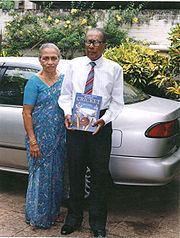 Born to Instructor Commander
Born to Instructor Commander
M. G. S. Perera, former Director of Naval Training, Royal Ceylon Navy and former Senior Staff Captain / Nautical Instructor (Training of Deck Officer Cadets) Ceylon Shipping Corporation (1977–1983) and Maureen Johanna Perera, he has one Sister, Deepthi C. J. Guneratne B.Sc.(Botany
), M.Sc.(soil chemistry
).
and the Royal College
Colombo and thereafter gained B.Sc.(Honours) from the University of Colombo
in May 1975 followed by a joint M.Sc. from the University of Colombo and the University of Birmingham
in July 1977. He thereby qualified professionally in the field of Analytical Chemistry
, specialising in the subject of Quality Assurance
, in which he holds an honorary PhD.
by profession and a Registered Analytical Chemist of the Royal Society of Chemistry
(RSC) in the United Kingdom
. He is a Fellow (FRSC) of the RSC
, of which he is an honorary life member and the former hony. secretary / treasurer (1984–1992) of its section in Sri Lanka
.
He is also a life member and a Fellow (FIChemC) of the Institute of Chemistry Ceylon and a Fellow (FIQA) of the Institute of Quality Assurance UK,.
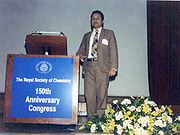 Perera possesses over ten years of work experience as a former senior manager
Perera possesses over ten years of work experience as a former senior manager
with two multinational pharmaceutical manufacturing companies.
His professional career started in August 1978 as an assistant lecturer at the department of Chemistry, University of Colombo. His work thereafter in the multinational pharmaceutical manufacturing industry extended for almost 14 years, from September 1978 until July 1992.
Perera started his career in industry as a production executive with Glaxo Ceylon Limited
and stayed until March 1982.
Mackwoods-Winthrop Limited then hired his services as the senior manager in charge of their quality assurance
and analytical control divisions until March 1989, and thereafter as the senior manager
of the newly established technical services department.
Perera then changed over to the cosmetics and healthcare industry when Hemas Manufacturing Limited invited him to join them in August 1992 as the Director / Senior Manager of quality assurance and product development.
But it was only 14 weeks service there for Perera, as a freak road accident on 12 November 1992 made him instantaneously
a paraplegic for life and cut short tragically, at the age of 38, his professional career that was just blossoming out.
, the game he still loves, with genuine commitment. His impressive scoreboard, as at 2011 July, indicates a stupendous innings (commenced in 1972), recorded as: retired - not out in entering the 39th year.
His professional achievements in the cricketing sphere have extended to almost all possible vital avenues of the game reaching often the professional levels - as a player, umpire, scorer, training instructor and examiner on its laws, administrator, writer, author, and even an activist promoting 'enabling facilities for all' at cricket stadia, etc.
, as a passionate utility player who combined his undergraduate and postgraduate education with cricket. He represented regularly the University of Colombo
for seven consecutive years between 1972 and 1978, and played at Inter-club Division - One two-day tournament cricket conducted by the Board of Control for Cricket in Sri Lanka (BCCSL) for the P. Saravanamuttu Trophy, which was then considered as the main first-class domestic cricket competition in the country.
In 1975, whilst still an undergraduate, Perera qualified to become a cricket umpire. He is the first and only test-match-panel
Cricket Umpire the Royal College
Colombo and the University of Colombo
have ever produced.
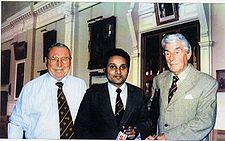 Sri Lanka gained test status in 1981 as a full member of the international cricket council
Sri Lanka gained test status in 1981 as a full member of the international cricket council
. Yet, it was still the era when cricket scoring was hardly given any kind of importance.
Perera soon realised, as his short-term goal, the vital importance of qualifying professionally and acquiring practical experience at the highest possible level available to him in several key aspects of the game, so as better to serve Sri Lankan Cricket.
In the Preface to The Golden Era of Sri Lankan Cricket Leslie Cheeseman B.E.M. described Perera’s endeavours as:
"Even in those early days, the perceived extent of his unbridled enthusiasm, the level of his intended personal commitment, analytical mind, high degree of technical knowledge of the game and its governing laws, plus his unquenchable thirst for newer knowledge and practical experience at higher level of the game together with his willingness to further improve individual performance, made Perera to decide to go to England, several times at his own expense, to achieve this goal".
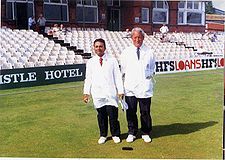 As a result Perera became the First Sri Lankan to be accepted and recognised by the prestigious body the Association of Cricket Umpires and Scorers England as a professionally qualified cricket umpire (24 October 1985), scorer
As a result Perera became the First Sri Lankan to be accepted and recognised by the prestigious body the Association of Cricket Umpires and Scorers England as a professionally qualified cricket umpire (24 October 1985), scorer
(7 April 1987), then also as a 'scorer competent in advanced scoring techniques' (25 March 1990), a Grade - A senior training instructor in the art and craft of both cricket scoring and cricket umpiring (August 1990) and finally, also as an effective examiner (1 November 1998) on the Laws of Cricket
, all offices of this reputed association.
For 15 weeks of the British summer in 1990, Perera, afforded the rare opportunity, umpired matches in England in Lancashire
county four-day second eleven and in topmost premier leagues in the area, viz. Bolton & District Cricket Association, Bolton League and Central Lancashire, where the standard of professional competitive cricket was accepted as among the highest in England and gain much needed exposure to professional competitive cricket.
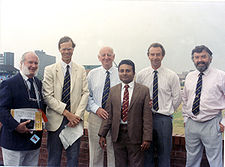 After 17 years of hard work, sacrifice, loads of patience and, refusal to bow down to pressure and change his ways to please anyone at the centre, Perera, at the age of 36, made his way to the six-member Sri Lanka test-match-panel
After 17 years of hard work, sacrifice, loads of patience and, refusal to bow down to pressure and change his ways to please anyone at the centre, Perera, at the age of 36, made his way to the six-member Sri Lanka test-match-panel
of cricket umpires on 10 November 1992.
In 10 days’ time Perera was due to stand in his first test match in Colombo
Sri Lanka vs New Zealand
. It was so…… very close yet so far for Perera.
In 1996, he was highly commended by the then Sri Lanka Cricket Board in becoming of great assistance to them, as single-handedly, Perera accepted and satisfactorily completed its highly technical assignment to streamline the rules and regulations governing 2, 3 and 4-day division - 1, division - 2 and under 24 major tournament cricket in Sri Lanka.
Seated on a wheelchair, battling paraplegia
and balancing a laptop, he authored two A-4 size internationally famed books on cricket, The Golden Era of Sri Lankan Cricket (May 1999) ISBN 955-96698-0-X and Thinking Cricket (September 2001) ISBN 955-96698-1-8. They were also published by him without any external financial support.
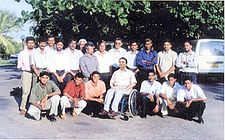 In December 1999, at the request of the Sri Lanka Cricket Board, Perera designed and conducted over four half-days the first formal training and evaluation programme for the top Sri Lanka scorers, in preparation for the under-19 cricket world cup tournament that was held there in January 2000.
In December 1999, at the request of the Sri Lanka Cricket Board, Perera designed and conducted over four half-days the first formal training and evaluation programme for the top Sri Lanka scorers, in preparation for the under-19 cricket world cup tournament that was held there in January 2000.
Perera has also turned a pioneer disability activist campaigning in Sri Lanka for enabling sports environments and user-friendly facilities.
 Wisden Cricketers’ Almanack (millennium
Wisden Cricketers’ Almanack (millennium
edition) has seen fit to regard Perera as one of only eight cricketing people to be specifically recognised for his many achievements and worthwhile contributions to the game.
He also became a proud recipient (1999) of the star of Asia award for excellence in sports.
On 30 January 2003, Perera and 15 other retired test match and one-day international panel senior umpires of Sri Lanka were recognised for the dedicated long years of thankless services rendered to the game and felicitated.
On 30 September 2005, Perera, for his internationally recognised significant contributions to cricket literature, became the first author in the annals of his country’s sports literature to be recognised and honoured formally at a literary awards festival.
On 30 August 2007 again, Perera was amongst five cricket scorers recognised and honoured befittingly for the untiring and admirable services rendered to this vital aspect of the game.
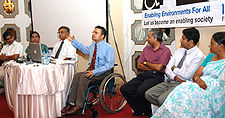 Perera is a pioneer campaigner in Sri Lanka for social exclusion focusing equal opportunity
Perera is a pioneer campaigner in Sri Lanka for social exclusion focusing equal opportunity
, justice and dignity of all people in day-to-day life - the key concept in this context being universal design for inclusion of people.- (meaning construction of environments that enable so as to include all and exclude none.)
Perera, also the pioneer campaigner in Sri Lanka for enabling sports environments and user-friendly facilities has insisted: "sports should encourage social inclusion of all people. Over three million Sri Lankans, for different reasons, experience restricted mobility. Cricket, football and rugger are spectator sports. Clubs must understand that a spectator lost is a lost revenue opportunity. They should realise it is their moral duty to see their facilities welcome all people at grounds. The little money spent here will be a ‘big Investment’ that will bring dividends, not just expenditure".
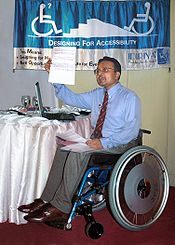 The skills he possesses backed by his inherent leadership and integrity, have aided Perera in creating the right awareness, engaging support and catalysing change towards achieving this goal.
The skills he possesses backed by his inherent leadership and integrity, have aided Perera in creating the right awareness, engaging support and catalysing change towards achieving this goal.
He is a fervent advocate of built environments and facilities that are a joy rather than a trial to use by everyone. He has constantly used the weapon of persuasion to convince people that the cumulative result of even small changes could be substantial.
Perera has also pioneered the campaign in Sri Lanka for accessible tourism, recognising it as an overlooked growth market and new profit resource for Sri Lanka.
Several hotels have already obtained his guidance and advice which is good testimony to his competence also as a disability access auditor who fully understands mobility related access issues and provides the right practical solutions to overcome problems.
Perera was also instrumental in proposing to the Sri Lanka Standards Institution (SLSI) and paving the way in persuading them to establish the first Sri Lanka standard for design in building construction SLS ISO TR 9527:2006 in 2007, a fact which Dr. A. R. L. Wijesekera, the then Chairman SLSI, recognised as an achievement of national importance.
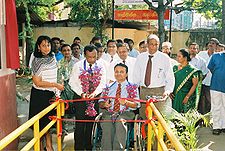 'Let us design to include everyone', is the message which lies at the heart of Enabling Environments for All, a campaign spearheaded by Perera. He believes: "Encouraging the designing of built environments that are compatible to all citizens should be a national goal".
'Let us design to include everyone', is the message which lies at the heart of Enabling Environments for All, a campaign spearheaded by Perera. He believes: "Encouraging the designing of built environments that are compatible to all citizens should be a national goal".
He has revealed the vision with which this mission of national importance is propelled by him.
Perera explained: "As life unfolds it is inevitable, for a variety of reasons, that we will experience a drop in our abilities. We all run similar risks that we shall have to live with reduced ability at some time in our life."
He emphasised: "When this happens, nobody should be disadvantaged or socially excluded through a lack of appropriate facilities at man-made public buildings and places. It is not a right that can be negotiated or diluted by anyone, under any circumstances".
Perera elucidated: "There is an obvious and easily available cost effective solution to prevent a series of grievous social problems you will otherwise face and leads to an unwanted colossal waste of our assets: designing our living environments to be enabling is the way forward".
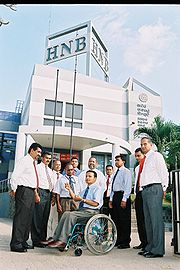 He insisted: "This makes good business sense in maximising its potential and certainly provides a Winning Way for the individual, his or her immediate family, businesses, and society and, in the end a better country".
He insisted: "This makes good business sense in maximising its potential and certainly provides a Winning Way for the individual, his or her immediate family, businesses, and society and, in the end a better country".
As there cannot be any margin for error here, a good understanding of disability related access issues and its intricacies becomes paramount.
Hence, authorities undertaking construction often need expert guidance and the right professional help as to how best to do this after careful assessment of each location.
Who can understand the issues, problems and solutions of access and egress better than an experienced dis-Abled person? Nobody.
To fill the void of a dearth of expertise, Perera has also become a trusted friend and a proven asset to the Sri Lankan society.
The list of organisations that have already benefited from his advice and guidance to get what they want is good testimony here.
Perera gets a fillip for accessibility rights
Thanks to the voluntary efforts of Perera with foresight, the inherent right of disabled persons to have unhindered access to public buildings and facilities received a substantial boost when the Supreme Court of Sri Lanka gave a landmark order on 27 April 2011 (See External links), further strengthening the earlier given order of 14 October 2009.
Perera, appearing in person on a wheelchair and seeking redress for physically disabled persons accessing new public buildings, successfully pursued single handed a public interest litigation fundamental rights application under reference SCFR 221/2009.
He argued the need to have the disability access laws and regulations already enacted some years ago, fully enforced and implemented from this date, so that, ALL Key Building Parts of NEW public buildings in Sri Lanka, toilets and wash facilities in particular, in the commercial, recreational, social, educational, residential and industrial categories, shall be constructed in accordance with ‘design requirements’ specified in the regulations.
His endeavours were aimed at minimising safety hazards for everyone, preventing further colossal losses the people and country incur, promoting social exclusion for all and enhancing productive and gainful opportunities for the widest possible range of persons, dis-abled persons in particular, in their day-to-day lives.
The court order, Perera ensured, further stated that all authorities empowered to approve building plans or issue ‘Certificates of Conformity’ for public buildings shall refrain from doing so in respect of any new buildings which violated these orders.
Building planners, architects, builders and local authorities together with owners and co-owners, as equally responsible partners, will be required to adhere to the legal requirements in regard to accessibility. Any violations of these court orders shall be a serious punishable offence incuring punitive repercussions. (See External links.)
At the last Presidential Elections held on 26 January 2010, Perera, in consultation with the Commissioner of Elections initiated voluntary action towards enabling the staff on duty at polling stations to be sensitive to the special needs of disabled voters, including those with significant physical, manual and visual impairments and worked towards providing polling stations and polling booths that would be more approchable and accessible to the disabled persons.
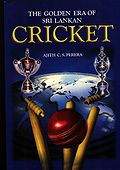 It’s an impressive memento which described the fascinating story of how his national team - Sri Lanka - blossomed out and established itself as International Champions of 1996/97 in Overs-limited cricket. Perera has also captured here the brilliance, the philosophy and the pulsating drama of one-day internationals (ODIs) of that glorious period (1996–98) backed by highly informative and well- tabulated appendices.
It’s an impressive memento which described the fascinating story of how his national team - Sri Lanka - blossomed out and established itself as International Champions of 1996/97 in Overs-limited cricket. Perera has also captured here the brilliance, the philosophy and the pulsating drama of one-day internationals (ODIs) of that glorious period (1996–98) backed by highly informative and well- tabulated appendices.
Further reading
Perera’s magnum opus never loses sight of what is required to make a complete cricketer - in every sense of the word. Former England skipper Mike Brearley has contributed the Preface while the then Sri Lanka’s cricket coach, Davenall Whatmore, the Foreword. It is the only self study training guide by an umpire for the players. It has won admiration and gained much recognition to the country from the cricketing world, which includes the ICC, MCC, ECB and even the prestigious Wisden Cricketers’ Almanack (2002).
Further reading
This book is a tribute to Perera’s father, who with unwavering dedication served Sri Lanka’s Navy and was instrumental in its training in its formative 25 years (1950–1975). Perera Senior saw the establishment of the Naval and Maritime Academy (NMA) at Dockyard Trincomalee, the turning point in formal Naval training in this country. In particular, the book pays tribute on the 5th anniversary of its subject’s death to the designer, the planner and the creator of the NMA. It is the long story of the Herculean efforts of this unsung hero, who made these and many more to happen over a period extending beyond 30 long years.
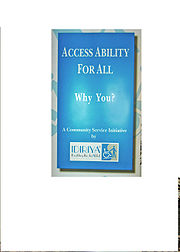
It’s an A-5 size consciousness-raising mind opener, free of technical jargon, on Accessibility to built environments to convince everyone that lack of access to built environments has already led to a colossal waste of our assets. It is an important National issue in which it is possible to make major strides forward: a Win - Win game for everyone enabling a formidable and sustainable national economy.
It is also a unique compilation in dispelling stereotypes and removing hang-ups that continue to surround dis-Ability towards establishing a society that does not marginalise or discriminate against persons with restricted mobility.
* Supreme Court Orders of 27 April 2011 - ‘Accessibility with Safety for All’
Chartered Chemist
Chartered Chemist is a chartered status awarded by the Royal Society of Chemistry in the United Kingdom and by the Royal Australian Chemical Institute in Australia....
, FRSC
Royal Society of Chemistry
The Royal Society of Chemistry is a learned society in the United Kingdom with the goal of "advancing the chemical sciences." It was formed in 1980 from the merger of the Chemical Society, the Royal Institute of Chemistry, the Faraday Society and the Society for Analytical Chemistry with a new...
(born 29 February 1956), is a Chartered Chemist
Chartered Chemist
Chartered Chemist is a chartered status awarded by the Royal Society of Chemistry in the United Kingdom and by the Royal Australian Chemical Institute in Australia....
by Profession, a scholar, a former senior manager
Senior management
Senior management, executive management, or management team is generally a team of individuals at the highest level of organizational management who have the day-to-day responsibilities of managing a company or corporation, they hold specific executive powers conferred onto them with and by...
in industry, a qualified training instructor and also a former test-match-panel
Test cricket
Test cricket is the longest form of the sport of cricket. Test matches are played between national representative teams with "Test status", as determined by the International Cricket Council , with four innings played between two teams of 11 players over a period of up to a maximum five days...
Cricket Umpire.
The international admiration Perera has won and the national recognition he has gained have come through his achievements, acquired both in Sri Lanka and in England in different fields: cricket
Cricket
Cricket is a bat-and-ball game played between two teams of 11 players on an oval-shaped field, at the centre of which is a rectangular 22-yard long pitch. One team bats, trying to score as many runs as possible while the other team bowls and fields, trying to dismiss the batsmen and thus limit the...
, analytical chemistry
Analytical chemistry
Analytical chemistry is the study of the separation, identification, and quantification of the chemical components of natural and artificial materials. Qualitative analysis gives an indication of the identity of the chemical species in the sample and quantitative analysis determines the amount of...
and quality assurance
Quality Assurance
Quality assurance, or QA for short, is the systematic monitoring and evaluation of the various aspects of a project, service or facility to maximize the probability that minimum standards of quality are being attained by the production process...
, in all of which he is academically and professionally well qualified and widely experienced.
"Cometh the hour, cometh the Man".
Now, by reason of personal adversity, the best out of Perera emerged in making him an accomplished author, writer, speaker, presenter, disability rights activist and an accessibility consultant on 'Enabling Environments' based on universal design principles who has campaigned against arbitrary categorisation of people whose abilities are diverse.
He is the founder
Entrepreneur
An entrepreneur is an owner or manager of a business enterprise who makes money through risk and initiative.The term was originally a loanword from French and was first defined by the Irish-French economist Richard Cantillon. Entrepreneur in English is a term applied to a person who is willing to...
and, as of 15 September 2011, holds the honorary position of Chief Executive / Secretary-General
Chief operating officer
A Chief Operating Officer or Director of Operations can be one of the highest-ranking executives in an organization and comprises part of the "C-Suite"...
of IDIRIYA
Idiriya
IDIRIYA, is a not-for-profit registered humanitarian organisation focusing on disability rights that fully understands disability related access issues that affect a wide range of people in day-to-day life that concerns even their safety and physical, mental and social well being.Based in Sri...
- (a registered, not-for-profit humanitarian service organisation in Sri Lanka).
Almost on the eve of umpiring his first cricket test match in Colombo
Colombo
Colombo is the largest city of Sri Lanka. It is located on the west coast of the island and adjacent to Sri Jayawardenapura Kotte, the capital of Sri Lanka. Colombo is often referred to as the capital of the country, since Sri Jayawardenapura Kotte is a satellite city of Colombo...
, Sri Lanka vs New Zealand
New Zealand
New Zealand is an island country in the south-western Pacific Ocean comprising two main landmasses and numerous smaller islands. The country is situated some east of Australia across the Tasman Sea, and roughly south of the Pacific island nations of New Caledonia, Fiji, and Tonga...
, a large wayside tree crashed on and straddled his moving car, killing his chauffer and leaving him instantaneously a paraplegic for life.
Even after becoming suddenly a wheelchair
Wheelchair
A wheelchair is a chair with wheels, designed to be a replacement for walking. The device comes in variations where it is propelled by motors or by the seated occupant turning the rear wheels by hand. Often there are handles behind the seat for someone else to do the pushing...
user for lifetime, Perera is still not out at the crease playing a straight bat to life’s googlies.
His ABILITY within disability in continuing to strive to serve humanity, has been an inspiration to everyone.
He has argued in favour of a more productive society that aspires to meet the day-to-day needs of people with diverse abilities and, has spearheaded voluntarily
Volunteering
Volunteering is generally considered an altruistic activity, intended to promote good or improve human quality of life, but people also volunteer for their own skill development, to meet others, to make contacts for possible employment, to have fun, and a variety of other reasons that could be...
the campaign in Sri Lanka for social inclusion focusing:all-inclusive user-friendly built environments.
Family

Commander
Commander is a naval rank which is also sometimes used as a military title depending on the individual customs of a given military service. Commander is also used as a rank or title in some organizations outside of the armed forces, particularly in police and law enforcement.-Commander as a naval...
M. G. S. Perera, former Director of Naval Training, Royal Ceylon Navy and former Senior Staff Captain / Nautical Instructor (Training of Deck Officer Cadets) Ceylon Shipping Corporation (1977–1983) and Maureen Johanna Perera, he has one Sister, Deepthi C. J. Guneratne B.Sc.(Botany
Botany
Botany, plant science, or plant biology is a branch of biology that involves the scientific study of plant life. Traditionally, botany also included the study of fungi, algae and viruses...
), M.Sc.(soil chemistry
Soil chemistry
Soil chemistry is the study of the chemical characteristics of soil. Soil chemistry is affected by mineral composition, organic matter and environmental factors.-History:...
).
Education
Perera completed his primary and secondary education at the Royal Primary SchoolRoyal Preparatory School
Royal Preparatory School was a preparatory school in Colombo, Ceylon . It was established in 1933 as a preparatory school to prepare students to the Royal College Colombo situated next to it...
and the Royal College
Royal College
A Royal College in some Commonwealth countries is technically a college which has received permission to use the prefix Royal. Permission is usually granted through a Royal Charter. The charter normally confers a constitution with perpetual succession and the right to sue or be sued independently...
Colombo and thereafter gained B.Sc.(Honours) from the University of Colombo
University of Colombo
The University of Colombo is a public research university located primarily in Colombo, Sri Lanka...
in May 1975 followed by a joint M.Sc. from the University of Colombo and the University of Birmingham
University of Birmingham
The University of Birmingham is a British Redbrick university located in the city of Birmingham, England. It received its royal charter in 1900 as a successor to Birmingham Medical School and Mason Science College . Birmingham was the first Redbrick university to gain a charter and thus...
in July 1977. He thereby qualified professionally in the field of Analytical Chemistry
Analytical chemistry
Analytical chemistry is the study of the separation, identification, and quantification of the chemical components of natural and artificial materials. Qualitative analysis gives an indication of the identity of the chemical species in the sample and quantitative analysis determines the amount of...
, specialising in the subject of Quality Assurance
Quality Assurance
Quality assurance, or QA for short, is the systematic monitoring and evaluation of the various aspects of a project, service or facility to maximize the probability that minimum standards of quality are being attained by the production process...
, in which he holds an honorary PhD.
Honorary degree
An honorary degree or a degree honoris causa is an academic degree for which a university has waived the usual requirements, such as matriculation, residence, study, and the passing of examinations...
Professional life: 1978–1992
Perera is a Chartered ChemistChartered Chemist
Chartered Chemist is a chartered status awarded by the Royal Society of Chemistry in the United Kingdom and by the Royal Australian Chemical Institute in Australia....
by profession and a Registered Analytical Chemist of the Royal Society of Chemistry
Royal Society of Chemistry
The Royal Society of Chemistry is a learned society in the United Kingdom with the goal of "advancing the chemical sciences." It was formed in 1980 from the merger of the Chemical Society, the Royal Institute of Chemistry, the Faraday Society and the Society for Analytical Chemistry with a new...
(RSC) in the United Kingdom
United Kingdom
The United Kingdom of Great Britain and Northern IrelandIn the United Kingdom and Dependencies, other languages have been officially recognised as legitimate autochthonous languages under the European Charter for Regional or Minority Languages...
. He is a Fellow (FRSC) of the RSC
Royal Society of Chemistry
The Royal Society of Chemistry is a learned society in the United Kingdom with the goal of "advancing the chemical sciences." It was formed in 1980 from the merger of the Chemical Society, the Royal Institute of Chemistry, the Faraday Society and the Society for Analytical Chemistry with a new...
, of which he is an honorary life member and the former hony. secretary / treasurer (1984–1992) of its section in Sri Lanka
Sri Lanka
Sri Lanka, officially the Democratic Socialist Republic of Sri Lanka is a country off the southern coast of the Indian subcontinent. Known until 1972 as Ceylon , Sri Lanka is an island surrounded by the Indian Ocean, the Gulf of Mannar and the Palk Strait, and lies in the vicinity of India and the...
.
He is also a life member and a Fellow (FIChemC) of the Institute of Chemistry Ceylon and a Fellow (FIQA) of the Institute of Quality Assurance UK,.

Senior management
Senior management, executive management, or management team is generally a team of individuals at the highest level of organizational management who have the day-to-day responsibilities of managing a company or corporation, they hold specific executive powers conferred onto them with and by...
with two multinational pharmaceutical manufacturing companies.
His professional career started in August 1978 as an assistant lecturer at the department of Chemistry, University of Colombo. His work thereafter in the multinational pharmaceutical manufacturing industry extended for almost 14 years, from September 1978 until July 1992.
Perera started his career in industry as a production executive with Glaxo Ceylon Limited
GlaxoSmithKline
GlaxoSmithKline plc is a global pharmaceutical, biologics, vaccines and consumer healthcare company headquartered in London, United Kingdom...
and stayed until March 1982.
Mackwoods-Winthrop Limited then hired his services as the senior manager in charge of their quality assurance
Quality Assurance
Quality assurance, or QA for short, is the systematic monitoring and evaluation of the various aspects of a project, service or facility to maximize the probability that minimum standards of quality are being attained by the production process...
and analytical control divisions until March 1989, and thereafter as the senior manager
Senior management
Senior management, executive management, or management team is generally a team of individuals at the highest level of organizational management who have the day-to-day responsibilities of managing a company or corporation, they hold specific executive powers conferred onto them with and by...
of the newly established technical services department.
Perera then changed over to the cosmetics and healthcare industry when Hemas Manufacturing Limited invited him to join them in August 1992 as the Director / Senior Manager of quality assurance and product development.
But it was only 14 weeks service there for Perera, as a freak road accident on 12 November 1992 made him instantaneously
Relativity of simultaneity
In physics, the relativity of simultaneity is the concept that simultaneity–whether two events occur at the same time–is not absolute, but depends on the observer's reference frame. According to the special theory of relativity, it is impossible to say in an absolute sense whether two events occur...
a paraplegic for life and cut short tragically, at the age of 38, his professional career that was just blossoming out.
Cricket career: 1972 –
Perera served cricketCricket
Cricket is a bat-and-ball game played between two teams of 11 players on an oval-shaped field, at the centre of which is a rectangular 22-yard long pitch. One team bats, trying to score as many runs as possible while the other team bowls and fields, trying to dismiss the batsmen and thus limit the...
, the game he still loves, with genuine commitment. His impressive scoreboard, as at 2011 July, indicates a stupendous innings (commenced in 1972), recorded as: retired - not out in entering the 39th year.
His professional achievements in the cricketing sphere have extended to almost all possible vital avenues of the game reaching often the professional levels - as a player, umpire, scorer, training instructor and examiner on its laws, administrator, writer, author, and even an activist promoting 'enabling facilities for all' at cricket stadia, etc.
Major achievements
Perera started playing serious cricketCricket
Cricket is a bat-and-ball game played between two teams of 11 players on an oval-shaped field, at the centre of which is a rectangular 22-yard long pitch. One team bats, trying to score as many runs as possible while the other team bowls and fields, trying to dismiss the batsmen and thus limit the...
, as a passionate utility player who combined his undergraduate and postgraduate education with cricket. He represented regularly the University of Colombo
University of Colombo
The University of Colombo is a public research university located primarily in Colombo, Sri Lanka...
for seven consecutive years between 1972 and 1978, and played at Inter-club Division - One two-day tournament cricket conducted by the Board of Control for Cricket in Sri Lanka (BCCSL) for the P. Saravanamuttu Trophy, which was then considered as the main first-class domestic cricket competition in the country.
In 1975, whilst still an undergraduate, Perera qualified to become a cricket umpire. He is the first and only test-match-panel
Test cricket
Test cricket is the longest form of the sport of cricket. Test matches are played between national representative teams with "Test status", as determined by the International Cricket Council , with four innings played between two teams of 11 players over a period of up to a maximum five days...
Cricket Umpire the Royal College
Royal College
A Royal College in some Commonwealth countries is technically a college which has received permission to use the prefix Royal. Permission is usually granted through a Royal Charter. The charter normally confers a constitution with perpetual succession and the right to sue or be sued independently...
Colombo and the University of Colombo
University of Colombo
The University of Colombo is a public research university located primarily in Colombo, Sri Lanka...
have ever produced.

International Cricket Council
The International Cricket Council is the international governing body of cricket. It was founded as the Imperial Cricket Conference in 1909 by representatives from England, Australia and South Africa, renamed the International Cricket Conference in 1965, and took up its current name in 1989.The...
. Yet, it was still the era when cricket scoring was hardly given any kind of importance.
Perera soon realised, as his short-term goal, the vital importance of qualifying professionally and acquiring practical experience at the highest possible level available to him in several key aspects of the game, so as better to serve Sri Lankan Cricket.
In the Preface to The Golden Era of Sri Lankan Cricket Leslie Cheeseman B.E.M. described Perera’s endeavours as:
"Even in those early days, the perceived extent of his unbridled enthusiasm, the level of his intended personal commitment, analytical mind, high degree of technical knowledge of the game and its governing laws, plus his unquenchable thirst for newer knowledge and practical experience at higher level of the game together with his willingness to further improve individual performance, made Perera to decide to go to England, several times at his own expense, to achieve this goal".

Scorer
A scorer in the sport of cricket is someone appointed to record all runs scored, all wickets taken and, where appropriate, number of overs bowled. In professional games, in compliance with the Laws of Cricket, two scorers are appointed, most often one provided by each team.The scorers have no say...
(7 April 1987), then also as a 'scorer competent in advanced scoring techniques' (25 March 1990), a Grade - A senior training instructor in the art and craft of both cricket scoring and cricket umpiring (August 1990) and finally, also as an effective examiner (1 November 1998) on the Laws of Cricket
Laws of cricket
The laws of cricket are a set of rules established by the Marylebone Cricket Club which describe the laws of cricket worldwide, to ensure uniformity and fairness. There are currently 42 laws, which outline all aspects of how the game is played from how a team wins a game, how a batsman is...
, all offices of this reputed association.
For 15 weeks of the British summer in 1990, Perera, afforded the rare opportunity, umpired matches in England in Lancashire
Lancashire
Lancashire is a non-metropolitan county of historic origin in the North West of England. It takes its name from the city of Lancaster, and is sometimes known as the County of Lancaster. Although Lancaster is still considered to be the county town, Lancashire County Council is based in Preston...
county four-day second eleven and in topmost premier leagues in the area, viz. Bolton & District Cricket Association, Bolton League and Central Lancashire, where the standard of professional competitive cricket was accepted as among the highest in England and gain much needed exposure to professional competitive cricket.

Test cricket
Test cricket is the longest form of the sport of cricket. Test matches are played between national representative teams with "Test status", as determined by the International Cricket Council , with four innings played between two teams of 11 players over a period of up to a maximum five days...
of cricket umpires on 10 November 1992.
In 10 days’ time Perera was due to stand in his first test match in Colombo
Colombo
Colombo is the largest city of Sri Lanka. It is located on the west coast of the island and adjacent to Sri Jayawardenapura Kotte, the capital of Sri Lanka. Colombo is often referred to as the capital of the country, since Sri Jayawardenapura Kotte is a satellite city of Colombo...
Sri Lanka vs New Zealand
New Zealand
New Zealand is an island country in the south-western Pacific Ocean comprising two main landmasses and numerous smaller islands. The country is situated some east of Australia across the Tasman Sea, and roughly south of the Pacific island nations of New Caledonia, Fiji, and Tonga...
. It was so…… very close yet so far for Perera.
Significant Contributions
Despite suddenly becoming a wheelchair user and continuing hardship, Perera is still thinking cricket and wanted to be useful. His dedication and devotion to the game remains stupendous.In 1996, he was highly commended by the then Sri Lanka Cricket Board in becoming of great assistance to them, as single-handedly, Perera accepted and satisfactorily completed its highly technical assignment to streamline the rules and regulations governing 2, 3 and 4-day division - 1, division - 2 and under 24 major tournament cricket in Sri Lanka.
Seated on a wheelchair, battling paraplegia
Paraplegia
Paraplegia is an impairment in motor or sensory function of the lower extremities. The word comes from Ionic Greek: παραπληγίη "half-striking". It is usually the result of spinal cord injury or a congenital condition such as spina bifida that affects the neural elements of the spinal canal...
and balancing a laptop, he authored two A-4 size internationally famed books on cricket, The Golden Era of Sri Lankan Cricket (May 1999) ISBN 955-96698-0-X and Thinking Cricket (September 2001) ISBN 955-96698-1-8. They were also published by him without any external financial support.

Perera has also turned a pioneer disability activist campaigning in Sri Lanka for enabling sports environments and user-friendly facilities.
Honours and recognitions
On 8 May 1999 the Association of Cricket Umpires Sri Lanka, in recognition of his twenty four long years of dedicated services, unstinted loyal support and unlimited contributions towards the betterment of the umpiring fraternity in Sri Lanka, at times at great personal sacrifice, unanimously elected Perera a ‘Life Member’.
Millennium
A millennium is a period of time equal to one thousand years —from the Latin phrase , thousand, and , year—often but not necessarily related numerically to a particular dating system....
edition) has seen fit to regard Perera as one of only eight cricketing people to be specifically recognised for his many achievements and worthwhile contributions to the game.
He also became a proud recipient (1999) of the star of Asia award for excellence in sports.
On 30 January 2003, Perera and 15 other retired test match and one-day international panel senior umpires of Sri Lanka were recognised for the dedicated long years of thankless services rendered to the game and felicitated.
On 30 September 2005, Perera, for his internationally recognised significant contributions to cricket literature, became the first author in the annals of his country’s sports literature to be recognised and honoured formally at a literary awards festival.
On 30 August 2007 again, Perera was amongst five cricket scorers recognised and honoured befittingly for the untiring and admirable services rendered to this vital aspect of the game.
Disability activist: 1997 –

Equal opportunity
Equal opportunity, or equality of opportunity, is a controversial political concept; and an important informal decision-making standard without a precise definition involving fair choices within the public sphere...
, justice and dignity of all people in day-to-day life - the key concept in this context being universal design for inclusion of people.- (meaning construction of environments that enable so as to include all and exclude none.)
Perera, also the pioneer campaigner in Sri Lanka for enabling sports environments and user-friendly facilities has insisted: "sports should encourage social inclusion of all people. Over three million Sri Lankans, for different reasons, experience restricted mobility. Cricket, football and rugger are spectator sports. Clubs must understand that a spectator lost is a lost revenue opportunity. They should realise it is their moral duty to see their facilities welcome all people at grounds. The little money spent here will be a ‘big Investment’ that will bring dividends, not just expenditure".
Significant Contributions
As a disability rights activist brimming possibilities in the disabled, Perera has aggressively promoted with relentless commitment the concept of establishing a society that does not marginalise or discriminate against people on the basis of limited mobility, either for short time, or long time or life time in attending to normal day-to-day life - the principal problem in this context.
He is a fervent advocate of built environments and facilities that are a joy rather than a trial to use by everyone. He has constantly used the weapon of persuasion to convince people that the cumulative result of even small changes could be substantial.
Perera has also pioneered the campaign in Sri Lanka for accessible tourism, recognising it as an overlooked growth market and new profit resource for Sri Lanka.
Several hotels have already obtained his guidance and advice which is good testimony to his competence also as a disability access auditor who fully understands mobility related access issues and provides the right practical solutions to overcome problems.
Perera was also instrumental in proposing to the Sri Lanka Standards Institution (SLSI) and paving the way in persuading them to establish the first Sri Lanka standard for design in building construction SLS ISO TR 9527:2006 in 2007, a fact which Dr. A. R. L. Wijesekera, the then Chairman SLSI, recognised as an achievement of national importance.

He has revealed the vision with which this mission of national importance is propelled by him.
Perera explained: "As life unfolds it is inevitable, for a variety of reasons, that we will experience a drop in our abilities. We all run similar risks that we shall have to live with reduced ability at some time in our life."
He emphasised: "When this happens, nobody should be disadvantaged or socially excluded through a lack of appropriate facilities at man-made public buildings and places. It is not a right that can be negotiated or diluted by anyone, under any circumstances".
Perera elucidated: "There is an obvious and easily available cost effective solution to prevent a series of grievous social problems you will otherwise face and leads to an unwanted colossal waste of our assets: designing our living environments to be enabling is the way forward".

Major achievements
As identified in the book entitled: 'Access Ability For All' by several professionals; Designing for Inclusion is a highly responsible humanitarian task of national importance involving precious time, money and effort.As there cannot be any margin for error here, a good understanding of disability related access issues and its intricacies becomes paramount.
Hence, authorities undertaking construction often need expert guidance and the right professional help as to how best to do this after careful assessment of each location.
Who can understand the issues, problems and solutions of access and egress better than an experienced dis-Abled person? Nobody.
To fill the void of a dearth of expertise, Perera has also become a trusted friend and a proven asset to the Sri Lankan society.
The list of organisations that have already benefited from his advice and guidance to get what they want is good testimony here.
Perera gets a fillip for accessibility rights
Thanks to the voluntary efforts of Perera with foresight, the inherent right of disabled persons to have unhindered access to public buildings and facilities received a substantial boost when the Supreme Court of Sri Lanka gave a landmark order on 27 April 2011 (See External links), further strengthening the earlier given order of 14 October 2009.
Perera, appearing in person on a wheelchair and seeking redress for physically disabled persons accessing new public buildings, successfully pursued single handed a public interest litigation fundamental rights application under reference SCFR 221/2009.
He argued the need to have the disability access laws and regulations already enacted some years ago, fully enforced and implemented from this date, so that, ALL Key Building Parts of NEW public buildings in Sri Lanka, toilets and wash facilities in particular, in the commercial, recreational, social, educational, residential and industrial categories, shall be constructed in accordance with ‘design requirements’ specified in the regulations.
His endeavours were aimed at minimising safety hazards for everyone, preventing further colossal losses the people and country incur, promoting social exclusion for all and enhancing productive and gainful opportunities for the widest possible range of persons, dis-abled persons in particular, in their day-to-day lives.
The court order, Perera ensured, further stated that all authorities empowered to approve building plans or issue ‘Certificates of Conformity’ for public buildings shall refrain from doing so in respect of any new buildings which violated these orders.
Building planners, architects, builders and local authorities together with owners and co-owners, as equally responsible partners, will be required to adhere to the legal requirements in regard to accessibility. Any violations of these court orders shall be a serious punishable offence incuring punitive repercussions. (See External links.)
At the last Presidential Elections held on 26 January 2010, Perera, in consultation with the Commissioner of Elections initiated voluntary action towards enabling the staff on duty at polling stations to be sensitive to the special needs of disabled voters, including those with significant physical, manual and visual impairments and worked towards providing polling stations and polling booths that would be more approchable and accessible to the disabled persons.
Books published: 1999 –
Perera in 1999 and then again in 2001 gifted the cricketing world through his own endeavours, two books of great educational value.The Golden Era of Sri Lankan Cricket
(1999 April); ISBN 955-96698-0-X
Further reading
- Sri Lanka were the Kings amongst Kings (1996 - 99) Retrieved on February 27, 2009
- Another masterpiece by Ajith Perera Retrieved on February 27, 2009
Thinking Cricket
(2001 September); ISBN 955-96698-1-8Perera’s magnum opus never loses sight of what is required to make a complete cricketer - in every sense of the word. Former England skipper Mike Brearley has contributed the Preface while the then Sri Lanka’s cricket coach, Davenall Whatmore, the Foreword. It is the only self study training guide by an umpire for the players. It has won admiration and gained much recognition to the country from the cricketing world, which includes the ICC, MCC, ECB and even the prestigious Wisden Cricketers’ Almanack (2002).
Further reading
- Thinking Cricket (February 2004) Retrieved on March 12, 2009
- This is no ordinary cricket book but a well-thought out book of instructions. By Mahinda Wijesinghe (2001 November) Retrieved on March 12, 2009
Teacher To The Navy - Instructor Commander M. G. S. Perera
(2004 August); ISBN 955-96698-2-6This book is a tribute to Perera’s father, who with unwavering dedication served Sri Lanka’s Navy and was instrumental in its training in its formative 25 years (1950–1975). Perera Senior saw the establishment of the Naval and Maritime Academy (NMA) at Dockyard Trincomalee, the turning point in formal Naval training in this country. In particular, the book pays tribute on the 5th anniversary of its subject’s death to the designer, the planner and the creator of the NMA. It is the long story of the Herculean efforts of this unsung hero, who made these and many more to happen over a period extending beyond 30 long years.

Access Ability for All - Why You?
(2008 May); ISBN 978-955-1914-00-4It’s an A-5 size consciousness-raising mind opener, free of technical jargon, on Accessibility to built environments to convince everyone that lack of access to built environments has already led to a colossal waste of our assets. It is an important National issue in which it is possible to make major strides forward: a Win - Win game for everyone enabling a formidable and sustainable national economy.
It is also a unique compilation in dispelling stereotypes and removing hang-ups that continue to surround dis-Ability towards establishing a society that does not marginalise or discriminate against persons with restricted mobility.
Further reading
- Thinking Cricket with Ajith Perera Retrieved on February 21, 2009
- Cricket Books by Ajith C. S. Perera Retrieved on March 10, 2010
- Design to include, not exclude, all people Retrieved on March 20, 2010
- International day of disabled persons 2008 Retrieved on February 7, 2010
- International day of disabled persons 2009 Part - I Retrieved on January 28, 2010
- International day of disabled persons 2009 Part - II Retrieved on January 29, 2010
- ISBN 978-955-1914-00-4 Access Ability for All - Why You? Publisher:IDIRIYAIdiriyaIDIRIYA, is a not-for-profit registered humanitarian organisation focusing on disability rights that fully understands disability related access issues that affect a wide range of people in day-to-day life that concerns even their safety and physical, mental and social well being.Based in Sri...
(May 2008). Accessed on February 12, 2010
External links
- The U.N. Convention - A Winning Road
- Accessibility: Whose responsibility and Why?
- Accessibility For Humanity - The Way Forward
- Accessibility Enables Everyone!
- Crusader on Wheels
* Supreme Court Orders of 27 April 2011 - ‘Accessibility with Safety for All’

